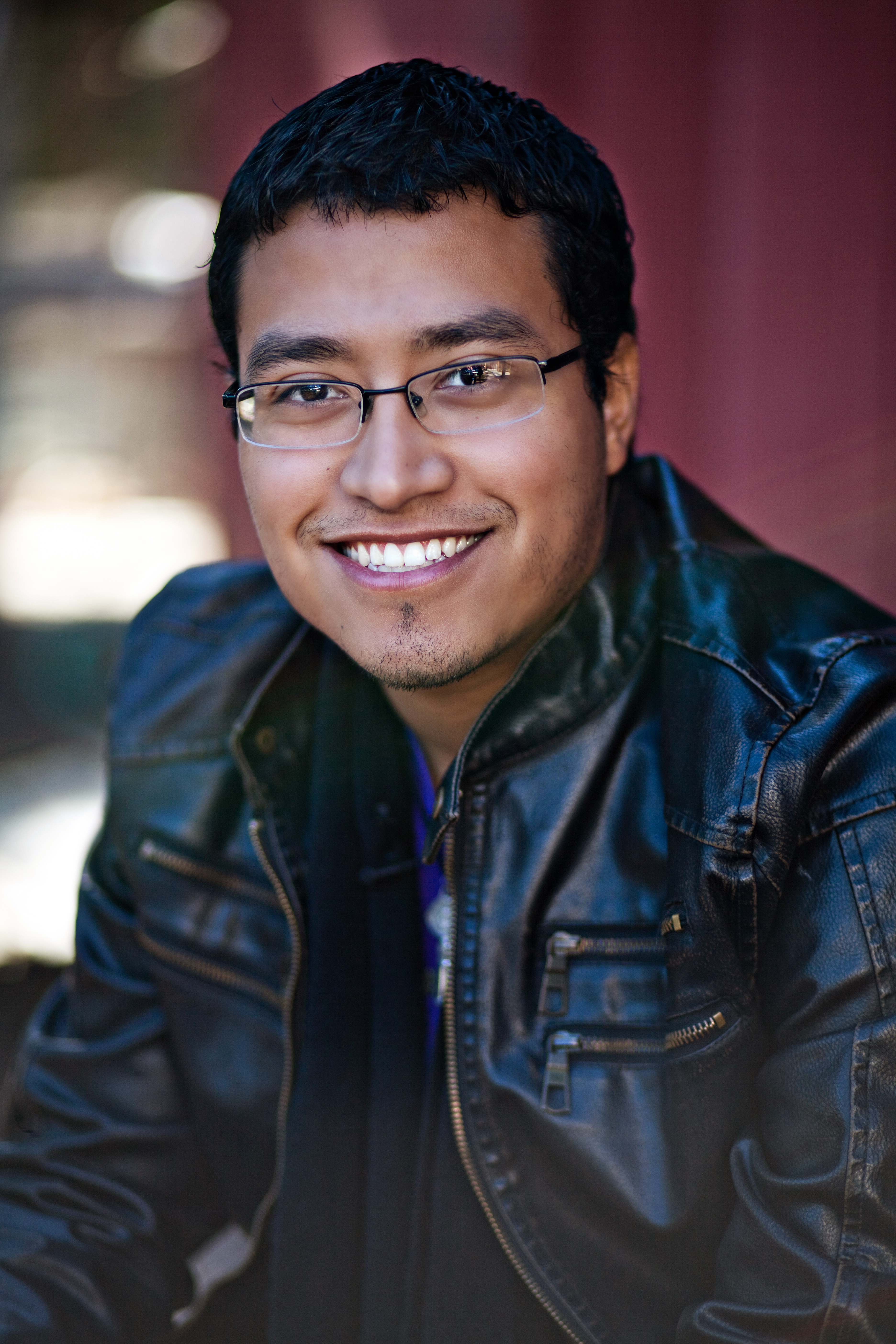
Abel Ibarra
is a suicide attempt survivor."I survived a suicide attempt."
Abel Ibarra is a student at the University of Texas. I first met him on campus when I gave a keynote speech for their Suicide Prevention Week activities. He was 21 when I interviewed him in Austin, TX, on November 27, 2013.
I guess it started last year, in the fall.
 I started noticing that I wasn’t myself…
I started noticing that I wasn’t myself…
I’m the kind of person who always has a smile for everything. When someone’s ever done something to me, someone has ever said something to me, I have always just kept that smile on my face. But I was just hiding everything behind it since my childhood because, when I was little, my dad left us. And so I’ve always had that sense of not being worthy of having people love me or, if I’m really close with people and someone does something to me, I really take it to heart, but I’ll never say anything.
I just kept everything inside. I never let anything out. I never want to talk about anything. I just live through it. I went through it like nothing was happening to me.
Last year, in the fall, it got to a breaking point that I just couldn’t handle anymore. I feel like, in that breaking point, it all just bursted out and then it all started being even more noticeable.
People would come up to me and be like, “Abel, what’s wrong? You’re always this happy person,” and things like that.
I started having [suicidal] thoughts, but [then I’d be like], ‘No, that’s crazy. I would never do that.’
But my mood was completely different. I was sad most of the time. I didn’t want to get out. I didn’t want to be around people—and I’m the person who was always around people. I just started feeling not myself, or the person I thought I was, I guess. Then I went home for Christmas.
Obviously, I wanted to be like, ‘No, I’m okay,’ so my mom wouldn’t see anything. I didn’t want her to know anything either.
When I came back [in the spring], that’s when things started getting really worse. That’s when I actually started cutting.
I would stand on bridges and be like, ‘I can just jump off this bridge right now.’ And for some reason, something always held me back. There were times where I would literally just stand on the bridge and be like, ‘Do I really want to do this right now? I can jump right now if I want to.’ There was just that constant back and forth fight against myself. You know, ‘Do I really deserve to be in this world right now? Am I even gonna be missed? Is this gonna happen?’
I started going to counseling at UT more and more. Before, I started calling 24-hour hotlines and things like that because, at times, I just couldn’t handle it. At times, I just needed someone to hear me, I guess. I didn’t even know what I wanted to say because I didn’t know what was wrong with me. I still don’t know what’s wrong with me sometimes. I don’t know what causes me to feel like this sometimes.
Then they sent me to the hospital by force. UT sent me to the hospital by force, ‘cause they thought I was a danger to myself. But I was able to get out, so I checked out voluntarily. So then, that week—it was in February—I was by myself in the apartment, ‘cause my brother and everyone had gone to Dallas. I walked to the kitchen and I was like, ‘I can easily just cut myself again and, this time for real, and no one’s gonna come.’ There was always that constant struggle throughout: do I deserve to be here or do I not deserve to be here?
And I feel like it all goes back to my childhood, because of that sense of abandonment. You know, am I worthy for people? Do people actually really care about me? It’s always those questions that come to my head, because how can the one person who is supposed to care for you—he’s the one who brought you into this earth, he’s the one who made you—how is that one person who is supposed to be there for you the whole time end up not being there for you? Everything goes back to that…
So, in the spring, that’s when everything started coming up even more. The thoughts were more severe.
I even wrote a letter to my mom—that’s the most important person in my life. In the letter, I was saying, “I’m really thankful for everything. I’m really thankful for you. I thank God every day that you were my mom. I appreciate everything you’ve done for me and my brother, for going out of your way to raise us by yourself.” [I wrote a lot of things about how grateful I was], like how much I loved her and things like that. Towards the end, I was just like, “I’m sorry. I’m sorry that I’m gonna put you through all this pain, but I just feel like that’s something I have to do.”
When I wrote that letter, I feel like all the other times I attempted, it was more [this feeling of] I want to do it but I don’t want to do it. When I wrote that letter, I felt like, ‘Shit, I just made that decision to go through with it…’
That day was a lot of struggle.
I’m in a fraternity, and I remember that one of my fraternity brothers, he called me. They kind of knew what was going on, but not really. They just knew I couldn’t be alone.
He called me and he was like, “Hey, I’m picking you up right now. I’m outside. Come outside.”
So I walked outside. I went with him that whole weekend. And he stayed with me the whole weekend because, I’m pretty sure something would have happened if I wasn’t around anybody, ‘cause no one was in my apartment. I was by myself.
After that, I was like, ‘I can’t do this anymore. I can’t be fighting constantly. I can’t do this alone anymore.” So that’s when I decided to go into a hospital. I decided to go back to the hospital, but this time I did it voluntarily.
I went to my counselor at UT and I was like, “Hey, I want to go to a hospital, but this time I want to stay there.”
She was like, “Okay, we’re gonna send you by force again so that you aren’t able to check yourself out.”
I stayed in the hospital for a whole week. It was helpful. They were giving me my antidepressants and things like that, and it was good to be away for a while. After I got out, I wasn’t perfectly fine. It’s still been ups and downs. Just yesterday, I had another breakdown, but I’m trying with everything I can to go to the different groups, continue my counseling, take my medication when I have to take it, ‘cause I don’t take it all the time. I only take it when I feel like I really need it, which is not a good thing, but that’s what I do.
And then just yesterday and I had another attack. I had another really down moment, which is really scary, because I was perfectly fine throughout the day and, out of nowhere, at night, I just started breaking down again and the same thoughts came into my head. And it’s always that. You’re really happy and then, in a matter of seconds, you’re really not.
Des: Why did you decide to tell your story?
Abel: I used to be really ashamed of just saying the fact that [I was] suicidal…
When I’m home, I go to church ‘cause my mom goes to church. I went to a youth group in church and we were talking about something—I forget exactly what we were talking about—and then the topic of suicidal [thoughts] and depression came up for some reason. Not a lot of people knew what I was going through, and so I just decided to share my story right there. After I told my story, another girl, she got the courage to say her story. Seeing that, I was just like, ‘Wow, by me sharing my story, it can do so much in somebody else’s life. Even if it’s not the same thing, it will still help somebody else in a way, and maybe the smallest way, but it will do something.’
I go to a group at UT and now I’m very open about it. If the topic comes up, then I’ll say, “Yes, I’m depressed, and I was suicidal at one point,” and I share that.
Just the other day, someone messaged me from the group and they were like, “Abel, I would like to say thank you. You’re very courageous and very brave for sharing your story. I want to thank you. Because of you, I can admit that I was depressed and I was suicidal, and I can accept it.”
And so, just because of that, I feel like your story can do so much…
I’m a strong believer in God, I really am. At first I would be like, “Why, God? Why are you making me feel like this? I haven’t killed anybody. I haven’t done like an ultra mega sin for me to feel like this.’
But then, when I started taking more control and being more like, ‘I have to fight this,’ I started seeing it as a sign, ‘cause I didn’t know what to do with my life. I started finding a purpose to it. That’s why I share my story, too. I don’t want to say God put me through that, but I went through that, so that was part of God’s plan for me—to be able to experience this whole situation so I can help someone out there. I’m a very strong believer in God’s plan and I feel like this was God’s plan for me, and that’s why I try to do everything I can.
Des: Is suicide still an option for you?
Abel: I’m not sure.
Des: Tell me why.
Abel: I don’t know. I feel like that’s something I can’t answer.
Des: That’s an honest answer.
Abel: Because I can’t sit here and say no when I don’t know how I’m gonna be tomorrow, you know, and I can’t sit here and say yes when I don’t know if it’s gonna happen or not.


